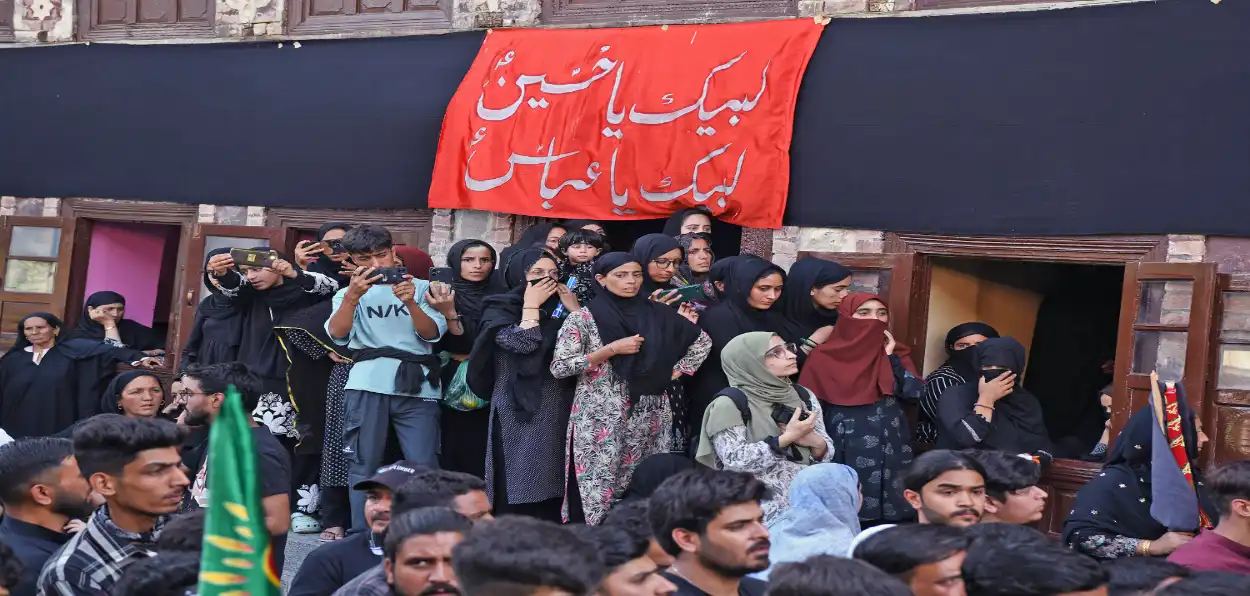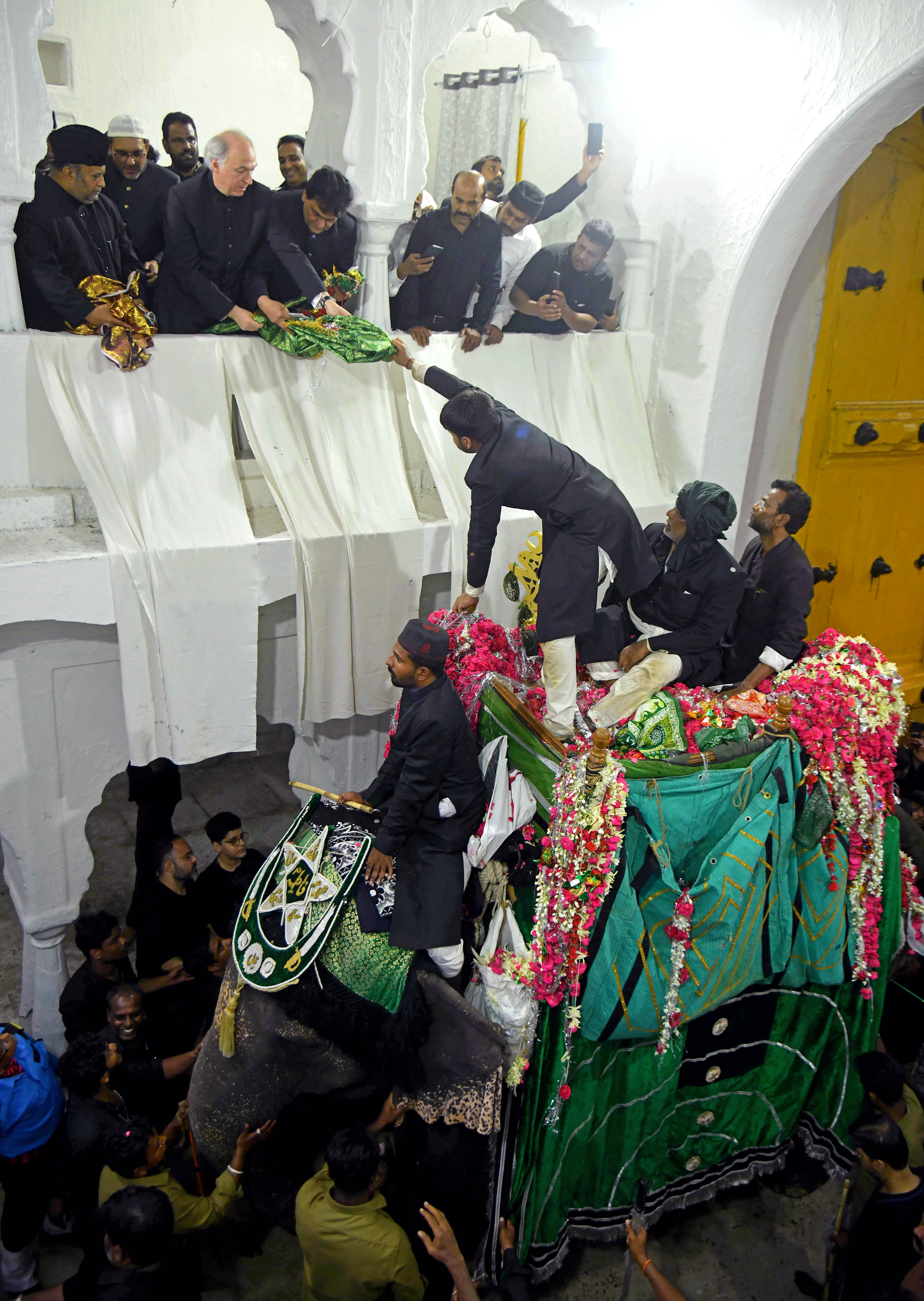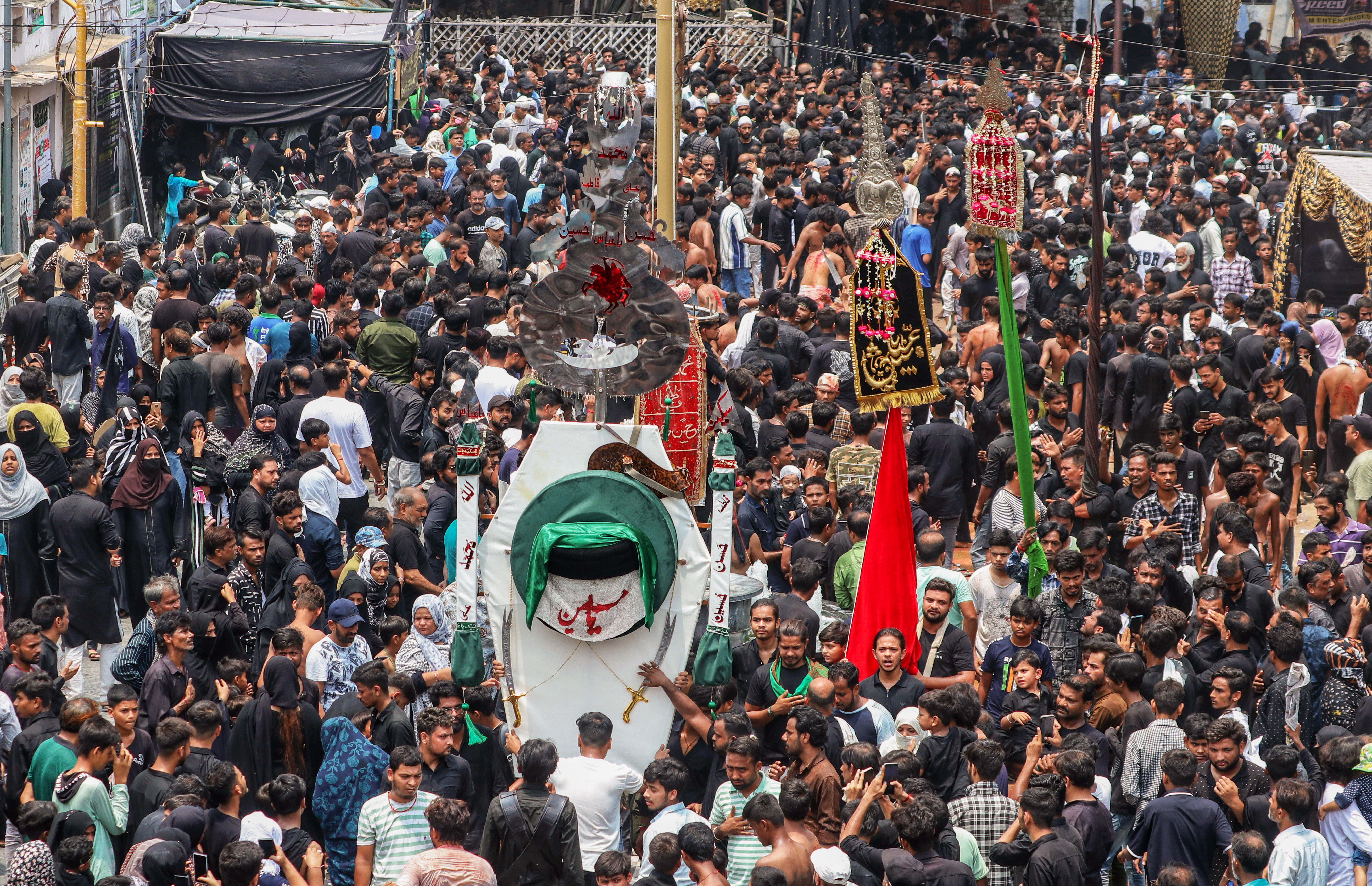
Shujaat Ali Quadri
Script writer of the TV serial Mahabharat, Dr Rahi Masoom Raza would say that Imam Hussain ibn Ali, grandson of Prophet Muhammad, became an Indian during Muharram. Raza’s proclamation emanates from the widespread marking of the martyrdom of Husain in the battle of Karbala by Indians across the country.
Muharram is dedicated to the martyrdom of Imam Husain who had challenged the tyranny of the second Umayyad Caliph Yazid. Muslims across the world observe the month in sorrow and pain avoiding celebrations and festivities.
Ashura, the 10th day of Muharram is marked with daylong mourning, including passionate acts of self-flagellation by devotees. Devotees inflict self-injuries with sharp weapons and iron chains. Sentimental poetry in memory of the Battle of Karbala and Husain’s sacrifice is recited in majlis (gatherings) throughout the month.
Taziya, symbolizing Imam Hussain in fasting, is taken out on the 10th of Muharram. It is made of wood, mica, and coloured paper and can be of any size and design. Each taziya has a dome.
The tradition of mourning in Muharram in India is as old as perhaps the advent of Islam in the Subcontinent. In India, the Muharram is marked differently from Kashmir to Kanyakumari.
Muharram has been a melting pot of Hindu-Muslim unification. Hindu and Muslim religious sensibilities fuse on sorrow. As a result, a large number of Hindu poets prominently figure among marsiya writers.
.webp) Muharram procession at Ajmer Sharif Dargah
Muharram procession at Ajmer Sharif Dargah
The credit for bringing the first Hindu marsiya writer to the fore goes to Kali Das Gupta Raza. He is considered an authority on Ghalib but also wrote marsiyas. Gupta Raza was a great admirer of Imam Raza and had added ‘Raza’ as his ‘takhallus’ out of his devotion to the Imam.
He was planning to compile a ‘tazkira’ of Hindu marsiya writers when he passed away. He however left behind a list and description of Hindu marsiya writers. From his account, one comes to know about the galaxy of Hindu marsiya writers.
According to him, the first Hindu marsiya writer was Ram Rao who used Saiva as his pen name. He belonged to Gulbarga and had migrated to Bijapur (Karnataka) during the reign of Ali Adil Shah. In about 1681, he translated Rozatush Shuhada in his marsiya into Deccani language. Sri Makkhan Das and Balaji Tasambak (Pen name Tara) are also worth mentioning. They flourished in Deccan after Ram Rao.
Another Hindu poet Swami Prasad also wrote marsiyas in Urdu under the pen name of ‘Asghar’.
 The ninth Nizam of Hyderabad offering Nazrana to the Taziya
The ninth Nizam of Hyderabad offering Nazrana to the Taziya
When the center of Urdu shifted from the South to the North and the Azadari thrived under the patronage of the Awadh dynasty in Lucknow, Hindu poets, and writers did not lag in participating in Muharram rituals. They ardently engaged in writing marsiyas.
The best and better-known among them was Munshi Channu Lal Lakhnavi. He wrote Ghazals under the pen name of ‘Tarab’ and marsiyas under the pseudonym, ‘Dilgir’. In his later period, he wrote marsiyas alone and distinguished himself in the field.
The Hindu marsiyanigars also included a woman named Roop Kanwar Kumari. She belonged to a family of Kashmiri Pandits who lived in Agra. She did not like to appear in public gatherings and had contacts only with those marsiya writers whom she regarded competent enough to guide her in her writing.
She wrote during the 1920s and ’30s. In her marsiyas, an intermixture of two cultural sensibilities is found. She had devised for herself a mode of expression wherein ‘Hindised Bhakti’ terminology and Persianised expressions of marsiyas are seen blending soundly. This blending of the two modes of expression imparts a new flavor to the marsiya and for this reason, she stands distinguished among her contemporary writers.
She relishes in calling Hazrat Ali a rishi, or a devotee, or simply maharaj and saying ‘Najaf Hamaray Liyai Harduar-au-Kashi Hai (Najaf is like Haridwar and Kashi for us). Here is a couplet of her unique style(Translarted from Urdu):
Ali’s loved by the two souls
No one knows Ali’s reality
But the Prophet and
God Almighty
 Shia Muslims take part in the 'Manzar-e-Karbala' procession during the month of Muharram, in Lucknow
Shia Muslims take part in the 'Manzar-e-Karbala' procession during the month of Muharram, in Lucknow
Raja Balwan Singh, son of Maharaja Chait Singh of Benaras also excelled in the composition of marsiyas. He was ousted from Benaras by the Britishers. He succeeded in winning a Jagir from the Maharaja of Gwalior. His son mostly lived in Agra and became a disciple of Nazir Akbarabadi. He distinguished himself as a marsiya writer, though he also wrote in other verse forms.
Similarly, a noble of Lucknow Lala Ram Prasad also used to compose marsiyas under the pen name, ‘Bashar’. He was a devotee of the Ahle-i-Bait. In his last days, he migrated to Karbala where he breathed his last.
Other notable Hindu and Sikh poets who made Karbala and martyrdom subjects of their poignant poetry were Rajender Kumar, Ram Bihari Lal ‘Saba’, Chandra Shekhar Saxena, Gauhar Prasad Nigam ‘Vilayat’ Gorakhpuri, Munshi Lakhman Narayan ‘Sakha’, Mahendra Kumar ‘Ashq’, Kunwar Mohinder Singh Bedi, Baswa Reddy, Jai Singh, Kishan Lal, Gopi Nath, Prof. Jagannath Azad, and Chandra Sharma ‘Bhuvan’ Amrohi. Bhuvan Amrohis following couplet represents the feelings of all Hindus:
Hind me kaash Hussain ibn Ali aa jaate
Choomte un ke qadam palke bichhate Hindu
(Had Husain ibn Ali migrated to India,
Hindus would prostrate to welcome him)
Despite the highly sentimental and extensive observation of Muharram, no untoward accident has been reported from any part of India. Some rare issues of law and order come to light and that too happens because of some management lapse as huge crowds assemble for mourning. Mourners can be seen lining streets and roads right in the heart of the capital Delhi and they are assisted by Hindu and Sikh social workers.
ALSO READ: Ustad Ghulam Ali who played Sarangi on Eiffel Tower
They mourn and then disperse with assistance from security forces. The same can be seen in cities like Lucknow, Hyderabad, Mumbai, and even in Srinagar. The pain of the family of the Prophet only incites a strong sense of peace.
Tabarukh (consecrated food) which is distributed in Muharram is also accepted by Hindus and Sikhs with great reverence.
The author is the President of the Muslim Students' Organisation of India (MSO)
